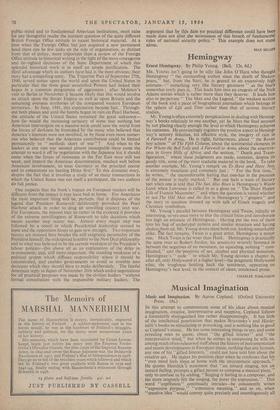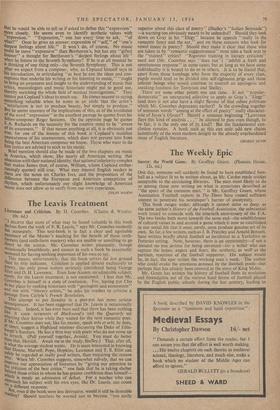Musical Imagination
IN this attempt to communicate some of his ideas about. musical imagination, creative, interpretative and receptive, Copland follows a formidably distinguished line rather disappointingly. It has little of the intellectual penetration that makes Stravinsky's and Hinde- mith's books so stimulating or provoking, and is nothing like so good as Copland's music. He has some interesting things to say, and some revealing ones to quote, about "the gifted listener" and "the interpretative mind, ' but when he comes to composing he tells us, among much often-rehearsed stuff about the history of instrumentation and recent developments in European music, nothing that any layman, any one of his "gifted listeners," could not have told him about the creative act. He makes his position clear when he confesses that his "own mind feels more at home with the unsystematic approach." He quotes Hanslick's statement that "an inward singing, not an inward feeling, prompts a gifted person to compose a musical piece," only to confuse us by adding, "Singing is feeling to a composer, and the more intesely felt the singing, the purer the expression." This word "expression" continually intrudes—he consistently writes "expressive purpose," "expressive meaning," and so on, when "creative idea" would convey quite precisely and unambiguously all
that he would be able to tell us if asked to define this "expression" rore closely. He seems even to identify aesthetic values with
"expression." "Expression," one has every time to ask, "of What?" Once he gives an answer: expression of "self," of "one's deepest feelings about life." It won't do, of course. No music Could be mole "expressive" than Beethoven's, but has any "gifted listener" a thought for Beethoven's "deepest feelings about life" When he listens to the Seventh Symphony? If he is at all musical he Is thinking of one thing only—the Seventh Symphony. This is not What we expect from a composer, who, as Copland himself says in his introduction, in articulating "as best he can the ideas and con- ceptions that underlie his writing or his listening to music," "ought to bring an awareness and insight to the understanding of music that critics, musicologists and music historians might put to good use, thereby enriching the whole field of musical investigations." They cannot put Copland's ideas to much use. He comes nearest to saying something valuable when he notes in an aside that the artist's "satisfaction is not to produce beauty, but simply to produce." But he seems unaware of the implications of this, as of the avoidance Of the word "expression" in the excellent passage he quotes from his fellow-composer Roger Sessions. On the opposite page he quotes
A. Richards on the necessity for the creative mind to be "aware Of its awareness." If that means anything at all, it is obviously not true, for one of the lessons of this book is Copland's manifest unawareness of his unawareness, which does not prevent him from being the best American composer we know. Those who want to do 'Injustice are advised to stick to his music.
Brief mention should also be made of the two chapters on music In America, which show, like nearly all American writing, that Obsession with their national identity, that national inferiority complex that makes James (not, of course, William, whom Copland embar- rassingly quotes) still true. What may interest English readers in them are the notes on Charles Ives, and the proposition of the difference between the European and American conceptions of rhythm, which unfortunately our slight knowledge of American Music does not allow us to verify from our own experience.
COLIN MASON



































 Previous page
Previous page